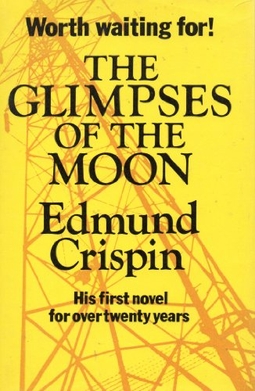
Edith Wharton was an American writer and designer. Wharton drew upon her insider's knowledge of the upper-class New York "aristocracy" to portray realistically the lives and morals of the Gilded Age. In 1921, she became the first woman to win the Pulitzer Prize in Fiction, for her novel The Age of Innocence. She was inducted into the National Women's Hall of Fame in 1996. Among her other well known works are The House of Mirth, the novella Ethan Frome, and several notable ghost stories.

Edmund Crispin was the pseudonym of Robert Bruce Montgomery, an English crime writer and composer known for his Gervase Fen novels and for his musical scores for the early films in the Carry On series.
Cruel and unusual is commonly used to describe certain controversial forms of physical punishment, for which see:

Crispin Hellion Glover is an American actor, filmmaker and artist. He is known for portraying eccentric character roles on screen. His breakout role was as George McFly in Back to the Future (1985), which he followed by playing Layne, one of the leading roles in River's Edge (1986). Through the 1990s, Glover garnered attention for portraying smaller but notable roles, including Cousin Del in Wild at Heart (1990), Andy Warhol in The Doors (1991), Bobby McBurney in What's Eating Gilbert Grape (1993) and the Train Fireman in Dead Man (1995).

The Age of Innocence is a 1920 novel by American author Edith Wharton. It was her eighth novel, and was initially serialized in 1920 in four parts, in the magazine Pictorial Review. Later that year, it was released as a book by D. Appleton & Company. It won the 1921 Pulitzer Prize for Fiction, making Wharton the first woman to win the prize. Though the committee had initially agreed to give the award to Sinclair Lewis for Main Street, the judges, in rejecting his book on political grounds, "established Wharton as the American 'First Lady of Letters'". The story is set in the 1870s, in upper-class, "Gilded Age" New York City. Wharton wrote the book in her 50s, after she was already established as a major author in high demand by publishers.
Swan song is a reference to an ancient, controversial belief that swans sing just before they die, and also an idiom for a final performance or accomplishment.
Ann Carol Crispin was an American science fiction writer, the author of twenty-three published novels. She wrote several Star Trek and Star Wars novelizations, and created an original science fiction series called StarBridge.
A blue moon is an astronomical phenomenon.
The Age of Innocence is a 1920 novel by Edith Wharton.
New moon is a lunar phase.
The Reckoning may refer to:
Edward Jerrard Tickell was an Irish writer, known for his novels and historical books on the Second World War.
Gervase Fen is a fictional amateur detective and Oxford Professor of English Language and Literature created by Edmund Crispin. Fen appears in nine novels and two books of short stories published between 1944 and 1979. Fen is an unconventional detective who is often faced with a locked room mystery to solve.

The Glimpses of the Moon is a 1923 American silent drama film directed by Allan Dwan and starring Bebe Daniels. It was produced by Famous Players–Lasky and distributed by Paramount Pictures. The film is based upon the 1922 Edith Wharton novel The Glimpses of the Moon.
The Glimpses of the Moon is a 1922 novel by Edith Wharton.

Beware of the Trains is a collection of detective short stories by the British writer Edmund Crispin published in 1953. It contains sixteen stories including Beware of the Trains which gave its title to the collection. They all feature Crispin's amateur detective and Oxford professor Gervase Fen, an eccentric with a genius for solving complex cases. A number also featured Detective Inspector Humbleby of Scotland Yard who also appears in two of the novels in the Fen series. Apart from one they had all previously appeared in the Evening Standard newspaper. It was the last work featuring Fen for many years, until Crispin returned to the character for the 1977 novel The Glimpses of the Moon.

The Glimpses of the Moon is a 1977 detective novel by the British writer Edmund Crispin. It was the ninth and last novel in his series featuring Gervase Fen, an Oxford professor and amateur detective. Written from the 1960s onwards on publication it was the first novel in the series to be released since The Long Divorce in 1951. The author died the following year and in 1979 a final work Fen Country, a collection of short stories featuring the detective, was publish posthumously.
This page is based on this
Wikipedia article Text is available under the
CC BY-SA 4.0 license; additional terms may apply.
Images, videos and audio are available under their respective licenses.






